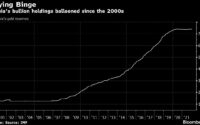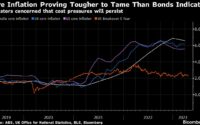The Fed will hurt some Americans no matter what it does: Morning Brief
This article first appeared in the Morning Brief. Get the Morning Brief sent directly to your inbox every Monday to Friday by 6:30 a.m. ET. Subscribe
Wednesday, September 21, 2022
Today’s newsletter is by Janna Herron, Yahoo Finance’s personal finance editor. Follow Janna on Twitter @JannaHerron.
The Federal Reserve is largely expected to raise its benchmark interest rate by three-quarters of a point on Wednesday, following two other similarly sized hikes this year. Whether the central bank follows through doesn’t matter much to some Americans.
That’s because no matter what the central bank does — hikes or no hikes — either outcome will likely still hurt Hispanic workers, Black workers, and the lowest earners. These are the Americans who are feeling the brunt of inflation now and who will suffer the most from a rise in unemployment that’s expected after the Fed’s hikes.
Mitigating that financial pain may fall outside the Fed’s control, but it could partly come down to the American public at large.
Already inflation — which grew unexpectedly hotter in August — is hitting all Americans’ budgets, but it’s been especially bruising for more financially vulnerable households, with a larger share of their income going to higher-priced necessities, as Claudia Sahm, former Federal Reserve and White House economist, recently pointed out in a chart shared on Twitter.
This has not been lost on Fed Chair Jerome Powell.
“We understand how painful it is, particularly for people who are living paycheck to paycheck and spend most of that paycheck on necessities, such as food and gas. And heating their homes. And clothing and things like that,” he said at the press conference following the Fed meeting in July. “We do understand that those people suffer the most.”
Hispanic and Black households are also faring worse when it comes to inflation — 58% of Black Americans and 56% of Hispanic Americans said recent price increases have caused them serious financial problems, according to a recent survey conducted for NPR, the Robert Wood Johnson Foundation, and the Harvard T.H. Chan School of Public Health, compared with 44% for whites.
Many are turning to credit to bridge the inflation gap. According to data Experian provided to Yahoo Finance, 54% of Hispanics and 42% of Black Americans said that they used credit cards to cover essentials in the past three months, compared with 34% of whites.
That’s setting these households up for more pain because credit card interest rates move in lockstep with Fed increases. Some of these consumers are already feeling those higher rates. Survey data provided by Nationwide found that 56% of Hispanic and half of Black respondents said rising interest rates had already negatively affected their personal finances moderately or extremely in the past six months, compared with 41% of whites.
Of course, more concerning is what happens in the job market.
“As I mentioned, there will be some, in all likelihood, some softening in labor market conditions,” Powell said in July when talking about what could result from the Fed’s search for price stability.
That softening, as Sahm pointed out, is about “workers losing their jobs, hours, and raises,” she wrote.
And we may be seeing some of that now. In August, the overall unemployment rate ticked higher to 3.7% from 3.5% as more workers entered the workforce — a positive trend during a labor shortage and underscoring workers’ confidence.
But the unemployment rate for Black workers rose at a sharper rate to 6.4% from 6% even as more Black workers left the labor force — a worrying development. The unemployment spike for Black workers fails to deliver on Powell’s promise last year to use the Fed’s levers to shrink the racial employment gap that widened during the pandemic.
The Hispanic unemployment also jumped higher — 3.9% to 4.5% — as did their participation rate. But Hispanics remain more worried about losing their jobs or having their hours cut than the average American, according to the Experian data, which found the same trend among those earning less than $50,000 of all races versus those who make more.
Does this mean these Americans are damned if the Fed raises rates and damned if it doesn’t? Maybe, but that’s not the end of the story.
“I’m looking toward what supports we can put in place no matter what happens in terms of inflation, in terms of unemployment,” Joanna Ain, associate director of Prosperity Now, said. “So, with rate hikes and everything connected to that, our most vulnerable families will be in the best place to deal with those challenges moving forward.”
Ain is talking about government supports that can help folks stay afloat similar to the ones enacted during the pandemic. That includes the expanded child tax credit, enhanced unemployment benefits, rental assistance, and increased food aid.
Those supports have largely gone away, but they can come back. It all depends not on the Fed, but on the actions of the Biden administration, Congress, and new lawmakers Americans elect in November.
Jay Powell might feel Americans’ pain, but the Fed’s actions will only keep hurting many of them.
What to Watch Today
Economic calendar
-
7:00 a.m. ET: MBA Mortgage Applications, week ended August 12 (0.2% during prior week)
-
10:00 a.m. ET: Existing Home Sales, August (4.70 million expected, 4.81 million during prior month)
-
10:00 a.m. ET: Existing Home Sales, month-over-month, August (-2.3% expected, -5.9% during prior month)
-
2:00 p.m. ET: FOMC Rate Decision (Lower Bound), September 21 (3.00% expected, 2.25% during prior month)
-
2:00 p.m. ET: FOMC Rate Decision (Upper Bound), September 21 (3.25% expected, 2.50% during prior month)
-
2:30 p.m. ET: FOMC Press Conference
Earnings
-
Lennar (LEN), General Mills (GIS), KB Home (KBH), Trip.com (TCOM)
Yahoo Finance Highlights
Beyond Meat suspends COO after alleged nose biting incident
The Fed has to pass ‘3 checkpoints’ to achieve soft landing: Strategist
Ford shocked investors just like FedEx — here’s what Wall Street is saying
—
Click here for the latest stock market news and in-depth analysis, including events that move stocks
Read the latest financial and business news from Yahoo Finance
Download the Yahoo Finance app for Apple or Android
Follow Yahoo Finance on Twitter, Facebook, Instagram, Flipboard, LinkedIn, and YouTube
[ad_2]
Source link


